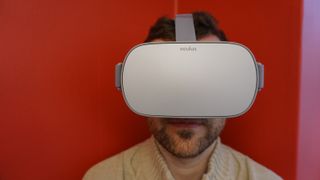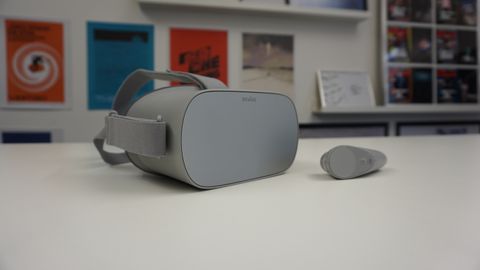Why you can trust TechRadar
Battery life
Battery life is a bit of a double-edged sword for the Oculus Go. You’ll get around 2 hours of gaming from a 3-ish hour charge, or about 2.5 hours of video according to Oculus’s claimed battery measurements, and that’s more or less in line with our experience.
You may, however, find those targets missed if you’re downloading lots of VR apps in the background while using the headset. Two hours of use against a three-hour charge may seem like a poor trade, and it’ll be especially noticeable if the headset is intended to be shared within a household.

However, you’re unlikely to want to spend that much time in a single undisturbed stretch inside a VR headset’s confines, so it’s hard to complain too much. Still, it’ll be a push to get through an entire movie in one sitting, which is unfortunate.
We also noticed a rare problem (which we failed to replicate after further testing) where the Oculus Go appeared to drop frames when approaching a depleted battery.
It’s worthy of the benefit of the doubt, but paired with the way some apps upon booting would very briefly flash the display white before settling, it suggests there’s still room for a little optimization here.
All in, though, it’s hard to argue with the performance of the Oculus Go. For a self-contained headset, not reliant on an external power source or processing unit, it delivers a fantastically diverse and approachable VR experience.
It’s no Vive Pro, but Oculus Go is the sort of device that would have seemed unfathomable just a few short years ago.
Verdict
Oculus Go does not disappoint. It offers excellent VR that, while not as good as what you’ll find on a PC-tethered headset, is still immersive and enjoyable.
Simply put, the whole Oculus Go package just works. From its design and content to the controller and visuals, it’s hard not to smile or, at times, simply be amazed when you’re using the headset.
It’s so good, you actually forget that it’s not tethered to anything and is running completely on its own.

Oculus Go is not a perfect device, but more often than not we were able to look past its flaws and truly enjoy ourselves. Oculus Go succeeds on many levels, and one area where it really excels is social VR.
When you’re in Oculus Rooms, “hanging out” with people half way across the world, there’s a sense that Oculus Go is being used for its intended purpose; what it was made to do. Social, of course, is what Facebook wants VR to be, and it has seemingly struck on the right formula with Oculus Go and Oculus Rooms.
Then, of course, there is the price. Oculus Go is not an inexpensive product; buying something for pure entertainment purposes for $199 / £199 may be a hard sell for some.
But, for what you get with Oculus Go, the price is hard to argue with. This is a premium product, and it feels like it from the moment you take it out of the box until the moment you remove it from your head after a session in VR.

Rather than having a bunch of competing headsets, Facebook views VR as sitting on a spectrum; those who want a high-end experience can opt for the more expensive Rift, while those who want something more casual or portable can go the ladder to Oculus Go and Gear VR.
Oculus Go is more than just a happy middle ground, however. As we’ve said, it represents a new era for VR, one that’s fun, deceptively powerful and much more accessible than anything that’s come before it.
Image credits: TechRadar
Michelle was previously a news editor at TechRadar, leading consumer tech news and reviews. Michelle is now a Content Strategist at Facebook. A versatile, highly effective content writer and skilled editor with a keen eye for detail, Michelle is a collaborative problem solver and covered everything from smartwatches and microprocessors to VR and self-driving cars.


